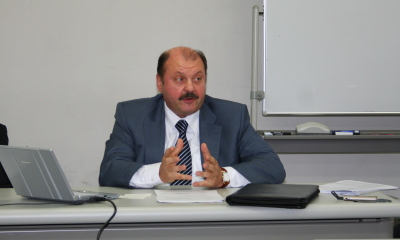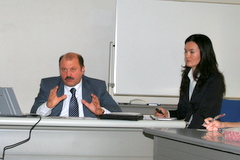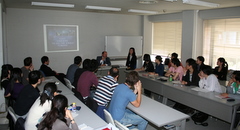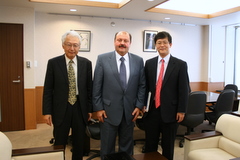The 51st Public Policy Seminar
"The Global Financial Crisis and the Ukrainian Economy: Policy Responses"
Dr. Mykola A. Kulinich, Ambassador of Ukraine
Venue: Room 3, 7th Floor Administration Bureau Bldg.2
Date: Friday, October 23, 2009
Time: 3:00-4:00pm
Jointly with the Financial Globalization and Regional Monetary Integration Case Study

Dr. Mykola A. Kulinich, Ambassador of Ukraine
Summary
On Friday, October 23rd, Ukrainian Ambassador to Japan Dr. Mykola A. Kulinich met with first and second year GraSPP students at The University of Tokyo's Hongo Campus. The lecture was chaired by Professor Shinichi Nakabayashi, with lively attendance of over 30 participants including international students from eight countries.
Global Financial Crisis and Policy Response
Adressing the current global financial crisis,
 the main topic for this open lecture, Ambassador Kulinich stated
that the crisis has dramatically changed the global economic situation, severely hitting the Ukrainian economy with triple shocks: decrease in prices of export goods, rise in energy prices, and foreign capital outflows. At the start of 2009, the Ukrainian economic situation sharply deteriorated, with both declines in real growth rate and export operations being closely followed by a rise in unemployment. In the financial and banking sector, foreign capital outflows caused a severe liquidity problem leading to a systemic credit freeze.
the main topic for this open lecture, Ambassador Kulinich stated
that the crisis has dramatically changed the global economic situation, severely hitting the Ukrainian economy with triple shocks: decrease in prices of export goods, rise in energy prices, and foreign capital outflows. At the start of 2009, the Ukrainian economic situation sharply deteriorated, with both declines in real growth rate and export operations being closely followed by a rise in unemployment. In the financial and banking sector, foreign capital outflows caused a severe liquidity problem leading to a systemic credit freeze.
In response to this harsh economic climate,
the Ukrainian government applied for the IMF stand-by loan program in order to stabilize Ukrainian currency and finance the state budget. In line with the program, Ukraine has implemented an array of anti-crisis measures, including the implementation of a flexible exchange rate regime,
 inflation reducing and conservative money supply measures, stabilization of the banking sector coupled with the daily monitoring of banks, and reduction of the state budget deficit. With these policy responses, Ambassador Kulinich noted that Ukraine seems to be beyond the worst of the crisis, with positive signs in monthly GDP growth rate, a rise in bank deposits, and an improvement in trade balance and FDI inflow signaling a return to stability.
inflation reducing and conservative money supply measures, stabilization of the banking sector coupled with the daily monitoring of banks, and reduction of the state budget deficit. With these policy responses, Ambassador Kulinich noted that Ukraine seems to be beyond the worst of the crisis, with positive signs in monthly GDP growth rate, a rise in bank deposits, and an improvement in trade balance and FDI inflow signaling a return to stability.
Japan-Ukraine Partnership
Regarding the Japan-Ukraine economic and political relationship, the Ambassador highlighted the importance of common stake and cooperation in both the business and policy arenas, providing examples of joint projects supported by Japanese trading companies, as well as mutual environmental concerns. He went on to note that working together under the framework set forth by the Kyoto protocol would not only reduce greenhouse gases, but also offer a means of modernizing the Ukrainian energy sector through implementation of advanced technologies from Japan. Ambassador Kulinich also pointed to the substantial progress in bilateral trade, which has increased six fold from 2004 to 2008.
Q & A session
The Ambassador was generously open to questions by participants. When asked by a student audience member to comment on the Ukraine-Russia
 energy dispute that erupted in January 2009,
leaving countries throughout Europe scrambling to provide energy resources to their citizens during the winter months, Ambassador Kulinich stressed that to understand the controversy one must look carefully at the historical relationship between the two countries. He noted that it was his opinion that any further trade or contract disputes that may arise between the nations would not reach the rather messy and undiplomatic level witnessed in early 2009.
energy dispute that erupted in January 2009,
leaving countries throughout Europe scrambling to provide energy resources to their citizens during the winter months, Ambassador Kulinich stressed that to understand the controversy one must look carefully at the historical relationship between the two countries. He noted that it was his opinion that any further trade or contract disputes that may arise between the nations would not reach the rather messy and undiplomatic level witnessed in early 2009.
